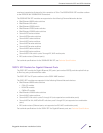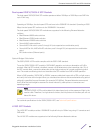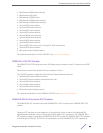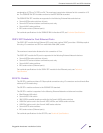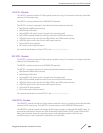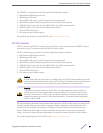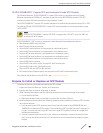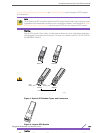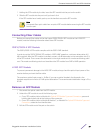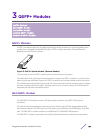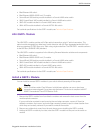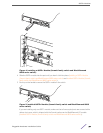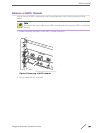
10/100/1000BASE-T Copper SFP and Industrial Grade SFP Module
The Extreme Networks 10/100/1000BASE-T copper SFP module is compatible with the Gigabit
Ethernet standard and 1000 Base-T standard as specified in the IEEE 802.3ab standard. This SFP
module provides a 100-Mbps connection using Category 5 cable.
The 10/100/1000BASE-T copper SFP module operates at a commercial temperature range (0C to 70C).
The Industrial Grade 10/100/1000BASE-T copper SFP module operates at a wide temperature range
(-40C to 85C).
Note
If the 10/100/1000BASE-T copper SFP GBIC is plugged into a 10G SFP+ port, the GBIC will
function only at 1G speeds.
10/100/1000BASE-T SFP module is supported in the following Extreme Networks devices:
•
BlackDiamond 8800 series switches
•
Black Diamond X8 series switches
•
Summit X440 series switches (not supported on combination ports)
•
Summit X450 series switches (not supported on combination ports)
•
Summit X450a series switches (not supported on combination ports)
•
Summit X450e series switches (not supported on combination ports)
•
Summit X460 series switches (not supported on combination ports)
•
Summit X650 series switches
•
Summit X650-24x switch: ports 1 through 22, VIM1 module ports
•
Summit X650-24t switch: VIM1 module ports
•
Summit X670-48x and X670V-48x switches
•
E4G series routers (Ethernet ports; not supported on E4G-400 combination ports)
For technical specifications for the ZR SFP+, see Technical Specifications.
Prepare to Install or Replace an SFP Module
Complete the following tasks before inserting the SFP module:
1 Inspect and clean the fiber tips, coupler, and connectors.
2 Prepare and clean an external attenuator, if needed.
3 When handling fiber cables, take the following precautions to prevent damage to the cables:
a Do not stretch the fiber.
b Make sure the bend radius of the fiber is not less than 2 inches (5.08 cm).
4 Extreme Networks recommends the following guidelines when installing or replacing SFP modules
on an active network:
a Use the same type of SFP module at each end of the link, except for the 1000BASE-BX and
100BSE-BX bi-directional SFP modules. The bi-directional SFP modules include a D-type and a
U-type. You must use one D-type SFP and one U-type SFP together to allow for a single fiber
bidirectional connection.
b Connect one end of the link to the Tx port. Without an attenuator, measure the total loss from
the Tx port to the other site of the link. The total loss must not exceed the total optical system
budget.
Extreme Networks SFP and SFP+ Modules
Pluggable Hardware Installation Guide 22





